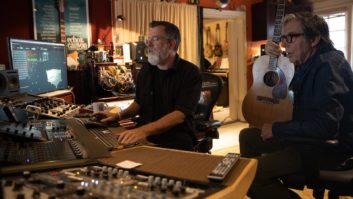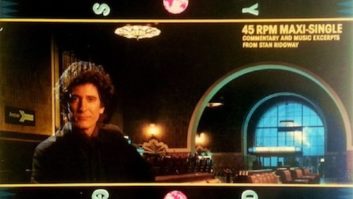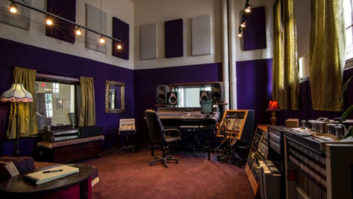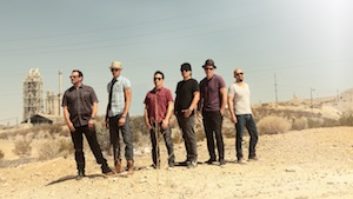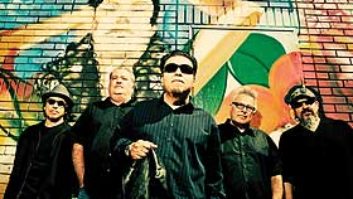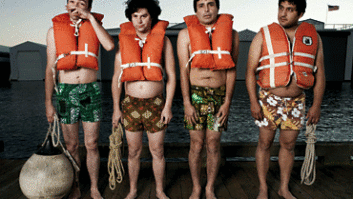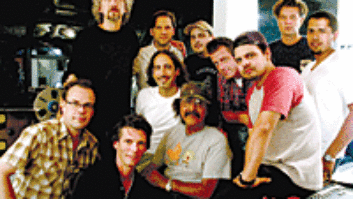Steve Berlin is a lucky man. He plays reeds and keyboards in one of the greatest bands of all time, Los Lobos. Yep, he’s the soulful white boy in the supremely talented and creative all-Latino band. Since the beginnings of his involvement with Los Lobos, too, he’s had a lot of input into their studio work, co-producing many of their efforts and always being heavily involved. Berlin says that from about the time he was 14 and playing in bands with older kids in his native Philadelphia, he was always the guy who was recording his groups, “or making the calls to set it up, putting the studio time together, helping with mixes.”
He’s parlayed this fascination with recording into a highly successful second career as a producer, amassing an impressive discography with a wide variety of fine bands and singer/songwriter types. Among them are Angélique Kidjo (Oyaya!), the Fabulous Thunderbirds (Painted On), Michelle Shocked (Mexican Standoff), Rickie Lee Jones (five tracks on Evening of My Best Day), the first two albums by Los Super Seven, Raul Malo (Today), Ozomatli (Embrace the Chaos, six tracks), Crash Test Dummies (The Ghosts That Haunt Me), Faith No More (Introduce Yourself), Buckwheat Zydeco (Five Card Stud), John Wesley Harding (Why We Fight), Beat Farmers (Tales of the New West) and a new album I’m particularly fond of, Jackie Greene’s American Myth. He often plays on the albums he produces, and he has been a session player on many records he didn’t produce. When does he sleep?
After decades living in L.A., Berlin has spent the past few years living in the Pacific Northwest (but also maintains a flat in So Cal). We caught up with the Busy One a few nights before a winter swing by Los Lobos, which found the band playing extended versions of all the songs from their unrivaled 1992 masterpiece, Kiko. Wow, that was a treat!
When and why did you move to the West Coast?
I moved to L.A. in ’75. There was nothing happening for me in Philadelphia; I was kind of floundering. Some of the guys I had been playing with [moved to L.A.] and were backing up Billy Preston, and then they were with Gregg Allman’s band for a while. So they convinced me to come out here around Christmas 1975. Actually, as a group we got signed to Casablanca, of all places, in 1976. I was 19 at the time, and it was a pretty big deal. It was a full-on record deal with all the bells and whistles, and they put us up at Indigo Ranch, which was a fine studio, and they assigned us a producer, who shall go nameless and who got paid a fortune. At this point, I’d produced a bunch of demos, but I figured here’s my chance to see what I’m doing wrong and see how the pros do it. Well, this guy literally made just about every mistake you could possibly make. Every brick he could trip on, he fell flat on his face. Every call was wrong, every musical decision was wrong. We had Ritchie Hayward [of Little Feat] playing drums and this guy fired him because he was unsteady! [Laughs] So this was an eye-opener. I thought, “Well, obviously if this guy can get paid this much to produce, there’s nothing I’m going to do that’s possibly going to be as lame as this guy — ever.” So from that point on, I felt it was sort of my destiny. [Laughs]
You were part of that incredibly vibrant new wave scene in L.A. in the late ’70s and early ’80s that incorporated everything from The Blasters to X to even more hardcore punk bands.
All of a sudden, there was a scene and places to play! We all knew each other and everybody was working out ideas. I remember the first Plugz record had come out. Everybody was making 45s, and at that time it felt like a real record. I was recording demos with zero budget. At that point, I had the idea that if something sounded good to me, it would probably sound good to other people, and I kind of went on from there. I joined The Blasters shortly after that, and then the Lobos thing happened not too long after that, and we were off to the races.
It was an amazing time to be in L.A. I’ve read about Paris in the ’20s and San Francisco in the ’60s, and I can’t say that the L.A. scene was the same thing, but it definitely had some of the same iconic signposts. It really was magical.
Ah, the magic of Downey, 1980!
Right! [Laughs] Under the Golden Arches, talking about when we were going to be stars! There was an ethic there that Lobos carries forth: You do it yourself, you don’t take any crap from anybody, you compromise as little as possible and you work as hard as you can. All those bands — X, The Blasters, The Plugz, The Weirdos — they weren’t f***in’ around; it was life or death. No matter what they were doing, they worked extremely hard at it and they really tried to create something of lasting value. It was great fun of course, don’t get me wrong, but we wanted to do something that mattered and create a lasting work of art.
What did you learn from other producers along the way, whether it was Mitchell Froom, T-Bone Burnett…?
Mitchell is definitely the guy who influenced me the most. I think he’s really a genius. His attention to texture was incredible.
You know, doing this Kiko show, we’ve gone back and listened to that album a lot. That album was really a co-production. We’d recorded about half the record, and then Mitchell came in and that’s when it really took off. I’m listening to it and hearing all these details that, at the time, sounded great, but now I realize that a lot of what gives the record its magical and mystical quality are these little detailed touches. And that idea has really rubbed off on me. I’ll be in with a band and they’ll be saying, “Why are we spending so much time on this little thing?” [Laughs] What I learned from Mitchell is that those details matter. It’s not just Mitchell, either, of course. It’s true on Motown records, Beatles records: The weird little sounds matter.
L-R: David Hidalgo, Cesar Rosas, Steve Berlin, Conrad Lozano, Louis Perez
photo: Danny Clinch
We’ve come to think of Mitchell and Tchad Blake as having a certain aesthetic based on what we’ve heard them do through the years: unusual sound choices, lots of compression, distorted microphones. But I think of your approach on a number of your productions as being almost straight-ahead documentary. I’m wondering how those two worlds collide in your work.
I’d like to respectfully disagree. I don’t try to do straight-ahead documentary. That would be kind of pointless. That said, Mitchell and Tchad have probably pushed the envelope a lot further in some regards than I would.
I try to bring a fresh slate to whatever I’m working on. There are certain tricks you pick up along the way that might work sometimes. But I remember there have been weird things I’d try on somebody else’s record that I’d be hopped up to bring back to Lobos, and it would be completely wrong. You can put as many arrows in your quiver as you want to, but 99 times out of 100, you’ve really got to start with a brand-new set of weaponry and try to figure it out with the people you’re working with. I really don’t try to bring an agenda to the records I make. I try to figure out where do they want to go? Do they even know where they want to go?
How often do they know where they want to go?
As the technology has become more understandable to people, and everybody’s basically got a home recording setup of some kind that isn’t just a cassette recorder, people have a lot clearer idea of where they want to go. The demos that people are making are getting closer and closer to their vision.
So will producers become superfluous?
I don’t think so. We are still the link to the full realization. A lot of times, the people I work with might set a relatively low horizon for themselves, and I’ll hear something and share an idea with them that we can turn it into something really, really huge. Don’t aim for the horizon line you can see. Aim beyond that and see how far you can get.
Even with people who come to me with relatively fleshed-out demos, there’s still a lot of elucidation and sketching in the frame that can happen. And that can be really rewarding — when you go off with the artist and discover that stuff together. Some of the records I’ve worked on that were the most fun were ones where we didn’t really have a map, but we got to the end in a really interesting way.
What’s an example of a record you produced that succeeded in that way?
The Raul Malo record, Today, is one I’m quite fond of. He wanted to make a Cuban-sounding record, like a Perez Prado, big, brassy, ’40s-type record, but with modern production. He came to me with really strong demos, and I hired a guy named Roberto Salas, who’s a really brilliant arranger that had worked on the second Super Seven record. And between us, we managed to get that flavor he was after — it’s big, ballsy, with these nasty horns; the vocals are huge.
Every situation is an amazing learning experience. There aren’t a lot of careers where you can start the morning with a blank slate and by the end of the day have something incredibly magical. And maybe have something magical in just four minutes. You can’t make a movie or write a book or paint a painting in four minutes. But you can certainly capture something unbelievably great in four minutes.
Raul’s one of those guys who doesn’t do anything small. I think when he goes out to pick up the paper in the morning, there are trumpets and swans. [Laughs] So making records with him is a blast.
So we had this paradigm in mind and we were able to really take it a long, long way to that end.
How much does being a working musician help in being a producer?
A lot. So much of a producer’s job is psychology. You want to be supportive, you want to be a friend of the artist, but you also want them to surpass themselves. I know what it’s like to be in front of the mic and to feel like you’re completely bereft of ideas, or the sound isn’t working, or the part isn’t working, or the instrument isn’t working and you feel like you’re lost. I know that personally and profoundly. [Laughs] Hopefully, that kind of empathy is one of the things I can bring to a session I’m producing. I also know when a band is “on,” and I know when a band is clicking and when it’s not. It’s something you know instinctually when you’ve played in bands.
I’ve done a lot of bands’ first records — Faith No More, Crash Test Dummies — and I can remember exactly what it feels like to make your first record and feel the weight of the pressure. You don’t want to suck and you want to measure up to the first AC/DC record or the first whoever record. It’s a very complex feeling that the engineer/producers I know who have never been performers will never completely understand.
How technical are you?
Not very. My experience is more in arrangement and the psychological aspect of it. I hire and know some of the most amazing engineers, and they’re guys I consider my friends — guys like Dave McNair and Robert Carranza and Tchad Blake. They are the absolute best at what they do, and I respect them so much.
Personally, I think being an engineer/arranger/producer is an awful lot of stuff to hold in your brain at once. Having to think about the punches and the psychological stuff sort of limits how you hear the musical possibilities. So I’ve been really lucky to work with people who understand me and how I like to do things, and let me focus 100 percent on the music and the people making it.
When you work with an artist for the first time, what’s the feeling-out period like? I see you worked with Rickie Lee Jones, Michelle Shocked — interesting singer/songwriter types. It must require a different head space from working with a band, where there’s input from a lot of different people.
Definitely. The fun thing about working with some singer/songwriters is I’ve had the opportunity to put together bands for those people. I’m almost never trying to capture just a single musician and her instrument. With both Michelle and Rickie, and a guy I just finished doing named Jackie Greene, we’ve gotten to sort of put our dream bands together and more or less cast the record. I think of it as a director casting a movie.
For instance, on the Michelle Shocked record, I got to put together this dream band where I used Pete Thomas on drums and Joel Guzman and his partner, Max Baca, who were part of the band on the first Super Seven record and have a band called Los Aztecs in Austin; they’re absolutely amazing. Joel is the best accordion player alive — he’s like the Art Tatum of accordion; I’m not exaggerating. It was a blast putting those guys together.
I was totally blown away by Jackie Greene when I saw him open for Los Lobos at the Fillmore last year.
I was, too! That’s one reason why I wanted to work with him. I think the record we made together is really great, too. He had 30 songs or more; he’s incredibly prolific and they were all great. There were definitely many good songs that got left behind because I wanted to make a really multifaceted record — it wasn’t going to be an all-rock record or a folk record.
This is another example where I got to bring in some players I like. On 75 percent of the album were Pete Thomas, Dave Faragher [both members of Elvis Costello’s Imposters] and Val McCallum; together, they’re a band called Jack Shit. The paradigm in my mind was a Faces record. I wanted it to sound like a band that understood each other so well, they could take the craziest chances and it would still feel completely coherent. On the other quarter of the record I used [Los Lobos drummer] Cougar Estrada and a bass player named Rene Camacho, who played on the Raul Malo record and the Rick Trevino record I made. We got some really interesting tracks with them. Jackie is this guy who has very little Latin in him or about him, and yet he’s got this groovy Latin feel on some tracks. It came out really well.
Has it ever not worked out — where you put together the wrong cast?
Definitely. I’m not batting a thousand, that’s for sure. There were times when the personalities didn’t mesh or the sound produced by the people you cast wasn’t quite right, so you get “chocolate menudo”: It might have been a really good chocolate fondue or a really good menudo, but it didn’t work with the two things at the same time. When it doesn’t work is when you really earn your money: “Okay, let’s see if we can make something interesting out of this.”
Have regular recording studios become less relevant to you, or would you always prefer a good studio if you’re given a decent budget?
A big budget is a nice thing to have…
And also really rare!
That’s true! But when I look back on the records I’ve made, some of the ones I liked the most were made with small budgets. And one reason, I think, is that having a smaller budget can force you to be creative. Having fewer choices, and maybe the ability to execute fewer ideas, makes you a lot more creative about the time you have and the choices you do make. So I’ve rarely thought a budget was too small to get the job done. And when it was, I’ve mentioned it in advance. The 30 to 60k budget is about as cheap as you could sensibly make many — but not all — records. You have to do your homework and be prepared, and you also have to be freewheeling in a way and commit to sounds and go with ideas. To have the time and budget to go back and reflect and constantly tweak sometimes takes away from what originally was a great idea.
As for the studios, I still like working in a good room; there are a lot of studios around town I like. But I’m also aware that, increasingly, artists are doing things at home. A lot of projects combine both approaches, and that’s fine with me.
When you work with a young band, is it hard to figure out the intraband dynamics and the unspoken politics? You’re having to discover for yourself, “Okay, who’s in control here? Who’s calling the shots?”
Definitely. There’s always tension — that’s the nature of every band! That’s another reason why being in a band helps me understand other groups because I know what it’s like to feel that push and pull. Every band has one guy who’s off on his own because he’s the songwriter or because he’s who he is. And there’s always strange internal dynamics that you never quite understand because nobody quite understands it, but you have to ride those waves as they occur. And to a certain extent, that’s what separates a really good producer from someone who is middle-of-the-road. Who can make the guy who’s the least happy a little happier so that it’s not cancerous?
